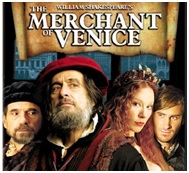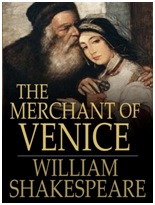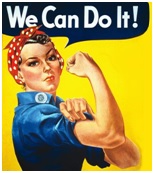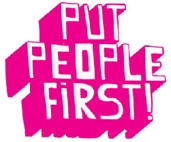|
 |
|
 |
Shakespeare's The Merchant of Venice -
Success and Ethics
The Merchant of Venice
Key characters Antonio, a merchant from Venice. Shylock, a Jewish moneylender and Antonio’s long time enemy. Portia, a heiress from Belmont (a state near Venice). Bassanio, Antonio’s friend who wants to marry Portia. Fun facts
The story In Venice Bassanio borrows money from the Jewish moneylender, Shylock, to woo the wealthy and beautiful, Portia. The rich merchant, Antonio, is legally responsible for repaying the loan but, if he can't, he agrees that Shylock can literally cut one pound of flesh from anywhere on Antonio's body. Meanwhile in the nearby city of Belmont, Portia discovers that, to inherit her father’s fortune, she must marry the man who chooses the lead casket after correctly interpreting the riddles on each of the three alternatives (silver, gold, or lead). Shylock’s daughter, Jessica:
Shylock is furious but cheered up by the thought that Antonio, his enemy, may go bankrupt, if one of his merchant ships sinks and he can’t repay the loan. Back in Belmont, Bassanio chooses the right (lead) casket and so can marry Portia. Gratiano, a friend of Bassanio and Antonio, announces thet he and Nerissa, Portia’s lady-in-waiting, also plan to marry. But their weddings are spoiled by news that Antonio has gone bankrupt, because his ships have been lost at sea. Shylock (whom Antonio loathes) wants to kill him by literally extracting his pound of flesh for not repaying the loan. Bassanio:
But he can’t persuade Shylock to accept the money. Shylock sues Antonio for the money. In court Portia and Nerissa (disguised as lawyers) unsuccessfully plea for Shylock’s mercy, until Portia brilliantly states that he is: entitled to a pound of flesh but not to shed a drop of Christian blood. (because that would lead to the confiscation of his property under Venetian law). So Shylock reluctantly agrees to take the money after all, but Portia also tells him that, as a foreigner attempting to kill a Venetian, he faces execution. The Duke of Venice immediately:
Bassanio and Gratiano triumphantly return to Belmont. But Portia and Nerissa (still in disguise) kid them along, scolding them for giving away their wedding rings to two lawyers, until they gleefully remove their disguise. Everyone (except Shylock) is happy. Antonio is now rich again, because his ships have miraculously returned safely.
Lessons on success and ethics 1. Money isn’t everything (but it helps!) The two richest characters (Antonio and Shylock) are the unhappiest. Shylock is despised as a Jew and consumed by:
Antonio is:
His friend, Salerio, suggests a belief in God may give him a more worthwhile purpose. Portia (Maggie Smith, pictured right, in a 1972 BBC production) is happy because she:
“All that glisters is not gold”, she says Gratiano warns against trying to win influence with money: “You have too much respect upon the world: They lose it that do buy it with much care”, he tells Antonio So money in the play is a
2. Anti-Semitism is awful Shylock is a Jew and Antonio, like most Venetians, despises him for it. Shylock:
Antonio (Jeremy Irons) is pictured right in the 2004 film.
3. Beware the letter (or literal interpretation) of the law Shylock’s literal interpretation of a “pound of flesh” is clearly unjust. Instead people must be governed by the spirit (or purpose) of the law. 4. Women are wonderful! Women are the stars of the play. Portia is:
But the leading men (Antonio, Shylock and Bassanio) all have problems.
5. Live simply Venice is a city of extravagant spending which leaves people like Bassanio in debt. 6. Give and you receive Antonio and Portia are both rewarded for their selfless giving (or altruism) by the loyalty and love of their friends (particularly Bassanio). The selfish Shylock is hated and miserable. Portia says that mercy is “twice blessed - it blesseth him that gives and him that takes”. 7. Know your children “It is a wise father that knows his own child”, Launcelot (Shylock’s and then Bassanio’s servant) tells his father. Shylock
So she says “our house is hell” and leaves home in desperation.
8. People before profit The play shows that people are more important than making money.
9. Work is important but sometimes stressful Antonio:
Antonio's sensitivity makes the risks of his shipping business particularly stressful.
10. Religion must be used for good Religion and holy scripture can be used for evil as well as good, as shown by Shylock’s humiliation and victimization. “The devil can cite Scripture for his purpose”, Antonio tells Bassanio.
Key quote on family It is a wise father that knows his own child, Launcelot (Bassanio's servant).
Key quotes on relationships The quality of mercy is not straineth; it droppeth as the gentle rain from heaven, Portia In the twinkling of an eye, Launcelot (Bassanio's servant)
Key quote on negotiating Take thou thy pound of flesh, Portia (to Shylock just before telling him that it is unlawful to shed any Christian blood in the process).
Key quote on love Love is blind, Jessica.
Key quote on leadership and management I can easier teach twenty what were good to be done than to be one of the twenty to follow mine own teaching, Portia.
Key quotes on happiness All that glisters is not gold, Portia (glisters is an old word for glitters, so the expression: All that glitters is not gold) It [mercy] is twice blessed - it blesseth him that gives and him that takes, Portia I fear he will prove the weeping philosopher when he grows old, being so full of unmannerly sadness in his youth, Portia (talking about one of her suitors)
Key quote on motivation He is well paid that is well satisfied, Portia.
Key quote on health They are as sick that surfeit with too much as they that starve with nothing, Nerissa.
Key quote on God and religion The devil can cite Scripture for his purpose, Antonio.
Key quotes on ethics To do a great right, do a little wrong, Bassanio. There is no vice so simple but assumes some mark of virtue on his outward parts, Bassanio.
Key quote on influencing people You have too much respect upon the world: They lose it that do buy it with much care, Gratiano (to Antonio). |
|
|
||
|
|
|
||
|
||
| Copyright © wisdomtowin.com All Rights Reserved | ||
|













